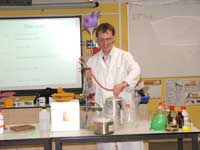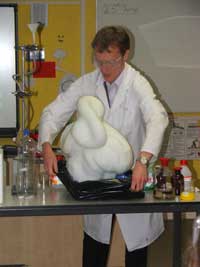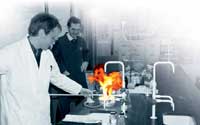A chemical bond: Nick Barker, linking schools and universities in the UK Inspire article
Lucy Patterson spoke to Nick Barker, a former secondary-school chemistry teacher and head of year who, after 12 years in the classroom, landed a dream job as a Royal Society of Chemistry (RSC) Teacher Fellow.

Image courtesy of Nick Barker
With a passion for teaching and working with young people, Nick Barker has set up and continues to run an active schools outreach programme in the chemistry department of Warwick Universityw1, UK. There, he bridges the gap between the classroom and the research bench, bringing chemistry alive for thousands of local school children.
The teacher fellowship scheme is run by the RSCw2 to strengthen the links between schools and higher-education institutes, and to help inspire the next generation of chemists. Answering an advertisement in a national newspaper, Nick was hired in January 2008, agreeing to base his fellowship at Warwick University, where he already had contacts. Such was the success of his first six months that, when the RSC funding for the position ran out, the university agreed to continue supporting the programme, which provides a range of different activities aimed at school students between the ages of 6 and 18.
Free to design his own outreach programme, Nick spends a lot of his time visiting local schools to deliver lectures and give demonstrations. For younger students, these cover the fundamentals of chemistry, along with less basic yet impressive concepts such as chemiluminescence, and accompanied by all the bangs and explosions of dramatic pyrotechnic displays.

famous ‘elephant’s toothpaste’
reaction at a secondary school
in Coventry, UK
Image courtesy of Nick Barker
“Very little is actually banned in schools,” explains Nick. “You just have to complete the paperwork and you can do all sorts of fun things. One primary-school class was particularly delighted when I blew a ceiling tile out with one demonstration, and children always seem very happy when a banana frozen in liquid nitrogen shatters rather than hammers a nail into a piece of wood as I intend. I did once get shouted at by a primary-school teacher when I hit a small child with a steel bar. He was protected with a thick sheet of foam rubber and a sheet of wood. It is a classic demonstration of the concept of pressure. You can whack the wood and the force is spread over a large area, so the person being hit barely feels anything. The child thought it was brilliant, but the teacher got very cross and told me that she had not put anything like that on her risk assessment form!”
For older students, Nick gives lectures with a more academic focus, describing some of the work that goes on at the university, to give a taste of what real-life scientific research is all about. And, when not out and about, Nick organises visits for school groups to the university chemistry department. This not only gives students the opportunity to see the inside of a real research facility but, with access to the university teaching laboratories, but also offers them hands-on experience of university-level chemistry with specially designed practical modules. His efforts have been very well received.
“Last academic year the programme reached around 3500 children. They can come from all backgrounds, ranging from elite independent schools to a pupil referral unit for children who have been removed from mainstream school. I organise and plan every last detail of this work myself, but I have a huge amount of support. The university and the school staff appreciate this work and want to be involved. In particular, academic staff from the department like to come with me to schools, to work with children and to tell them about their work – so we can say that we’ll even put a professor in your lesson! I teach the audience some chemistry, and then it’s the real scientist’s turn to explain what they do in the lab and why they enjoy science – I think that is more inspiring for the children than my lecture any day. It’s great to have the support of such motivated and talented people.”

bubbles filled with acetylene
gas, assisted by Matt Stanford
from Warwick University
Image courtesy of J Hunt
Having spent 12 years teaching chemistry to A-level students (aged 16-18), as well as all three sciences to 11-16 year-olds, Nick feels strongly about where priorities in education should lie. “I think that children should get a broad education that seeks to create rounded people who are interested in the world around them. Teaching is genuinely important to society. In fact, I think it may be one of the most important jobs of all. I was brought up to appreciate the value of education and to enjoy finding things out. What doesn’t work is when we become fixated by testing and measuring progress all the time. This takes the joy out of learning.”
Concerned with what he sees as an emphasis on examination, inspection and monitoring teaching standards in the British state education system, Nick believes that rather than maintaining standards, such measures serve only to divert energy away from the fundamental business of teaching. To him, the most effective and worthwhile approach is to build a real interaction with the students. “I don’t like worksheets, PowerPoint slide shows or teaching from books. I do like discussions, practical work, pushing a class to grasp complex topics, presenting fun practical chemistry demonstrations and laughter. I think genuine laughter is very important in a classroom; people learn better when they are relaxed and happy.”
And if that means hitting them with a steel bar, then Nick is the man to do it. Just be sure to check your risk assessment forms first!
The School Teacher Fellow scheme
The School Teacher Fellow scheme was initially conceived and developed by the Bristol ChemLabSw3, at Bristol University, UK. The idea was so successful that it was picked up by the RSC and is currently running with support from the biopharmaceutical company AstraZeneca. Teacher fellows either still in the RSC scheme or funded by their universities are based in several chemistry departments around the UK:
- Newcastle University – Peter Hoare (peter.hoare@newcastle.ac.uk)
- Bristol University – Tim Harrison (T.G.Harrison@bristol.ac.uk)
- Southampton University – David Read (D.Read@soton.ac.uk)
- Northumbria University – Anne Willis (anne.willis@northumbria.ac.uk)
- Surrey University – Penny Bagshaw (P.Bagshaw@surrey.ac.uk)
- Oxford University – Roger Nixon (roger.nixon@chem.ox.ac.uk)
- Sheffield University – Will Davey (w.davey@sheffield.ac.uk)
- Warwick University – Nick Barker (n.m.barker@warwick.ac.uk)
Email the teacher fellows if you would like them to visit your school or if you would like to take your class to visit them.
Web References
- w1 – Find out more about the Schools Outreach Programme at Warwick University’s chemistry department on their website: www2.warwick.ac.uk/fac/sci/chemistry/schools
- w2 – Learn more about the RSC, the largest organisation in Europe for advancing the chemical sciences, here: www.rsc.org
- w3 – For more information on the Bristol ChemLabS, see: www.chemlabs.bristol.ac.uk
- w4 – Science on Stage is a European initiative designed to encourage teachers from across Europe to share best practice in science teaching. See: www.science-on-stage.eu
Resources
- To learn more about chemiluminescence, see:Furtado S (2009) Painting life green: GFP. Science in School 12: 19-23.
- Douglas P, Garley M (2010) Chemistry and light. Science in School 14: 63-68.
- Besides having initiated the School Teacher Fellow scheme, the chemists from BristolChemLabS are very active at Science on Stagew4, and have reviewed a range of materials in Science in School.
- In addition, they have made some of the teaching activities they developed available through Science in School:
- Harrison T, Shallcross D (2006) Perfume chemistry, sexual attraction and exploding balloons: university activities for school. Science in School 3: 48-51.
- Griffin A, Harrison T, Shallcross D (2007) Primary circuses of experiments. Science in School 7: 28-32.
- Shallcross D, Harrison T (2008) Climate change modelling in the classroom. Science in School 9: 28-33.
- Shallcross D, Harrison T (2008) Practical demonstrations to augment climate change lessons. Science in School 10: 46-50.
- Shallcross D, et al. (2009) Fuelling interest: climate change experiments. Science in School 11: 38-43.
- Harrison T, et al. (2009) Looking to the heavens: climate change experiments. Science in School 12: 34-39.





